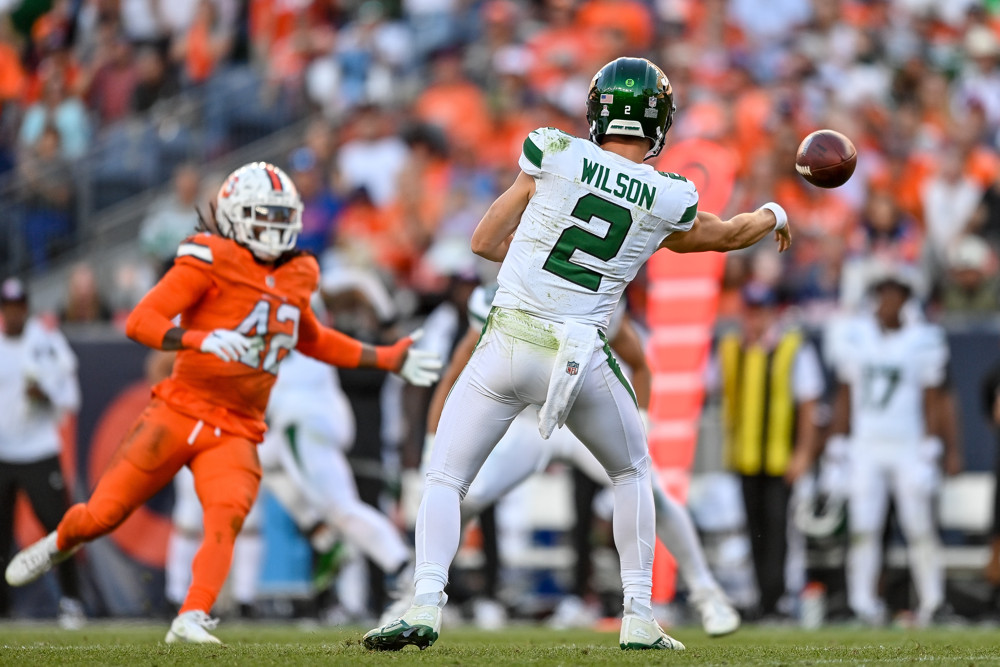
Soon after releasing the hotly contested new uniform looks, it was reported that the Denver Broncos would be trading for failed New York Jets quarterback Zach Wilson.
The move quickly invoked some strong reactions from the fanbase, but it really doesn’t deserve them.
The only reason this trade is even a notable news item is because of Wilson’s status as a former top-three draft pick and because of the nature of the quarterback position. This move will not have much of an impact on the Broncos’ 2024 season, barring a remarkable and highly unlikely leap in development from Wilson.
For evidence of that, one doesn’t even have to watch Wilson’s nauseating game film. Merely look at the terms of the deal itself.
Denver is moving down from the sixth round to the seventh round, while New York is eating half of Wilson’s contract to offload him.
Even if the Jets weren’t taking some of the financial hit, Wilson’s contract would’ve been $5.5 million over one year, making him a mid-tier backup with no commitment. However, even that was too rich, so the Broncos split the remaining money with Gang Green, resulting in Wilson being on a one-year backup contract worth $2.75 million — a little more than Easton Stick’s deal gives Stick annually.
If they cut Zach Wilson, Denver will have to eat some dead money, but cutting Stidham would result in a similar dead-cap charge, so that shouldn’t be enough justification for anyone to project Wilson as the new leader in the clubhouse or for him to prevent the Broncos from drafting a rookie. That’s especially trrue considering any financial savings that could’ve come from cutting Stidham have now been mostly devoured by the Wilson add, making it impossible to frame the move as a cap-focused one.
Meanwhile, Wilson’s play makes it impossible to argue for him as an upgrade, even with how underwhelming Stidham is.
Among the 77 quarterbacks with at least 100 non-garbage-time snaps since 2021 (when Wilson entered the league), Stidham ranks 35th in adjusted EPA per play and 16th in success rate, while Wilson ranks 69th and 68th, respectively.
Not only that, but Sean Payton’s biggest gripes with Russell Wilson — an inability to play on script and a tendency to create unnecessary sacks — also apply to Zach Wilson.
Zach Wilson was one of just four players who stopped pressures from becoming sacks at a lower rate than Russell Wilson and was one of the four players to be sacked more than Russell Wilson.
Jarrett Stidham is still by far the best option on the roster for running the Sean Payton offense we’re so used to, and considering Payton’s frustration with the way last season went, it seems like he’d favor that side of the equation.
So why add Zach Wilson?
Because it makes it so the Denver Broncos aren’t forced to draft a quarterback.
Ben DiNucci is a practice squad and third-string option. Entering the season with him as the backup would have been rough, and now the Broncos have someone else who can join Stidham to fill out the quarterback room, in the event they don’t draft one. Plus, while Wilson turning it around at this point in his career is pretty far-fetched, he does possess more upside potential than a Ryan Tannehill-type.
If the Broncos do a draft a quarterback, Wilson and Stidham will battle for a roster spot, and Stidham should be heavily favored.
This falls in line with a philosophy we’ve seen Denver deploy frequently under George Paton.
In 2021, he signed Kyle Fuller and Ronald Darby to address the glaring hole at cornerback and make it so the team wasn’t forced to draft a cornerback high, and could wait and see if the corner they loved fell to them. In 2022, he signed Randy Gregory, D.J. Jones, and Alex Singleton to minimize the needs in the front seven. This year, they’ve signed stopgap players like Matthew Peart, Malcolm Roach or Sam Mustipher.
Those who are suffering panic attacks or are imagining streets paved with gold as a result of this move are deluded and overdramatic. It’s a bandaid on the ‘backup QB’ wound, and nothing more.
